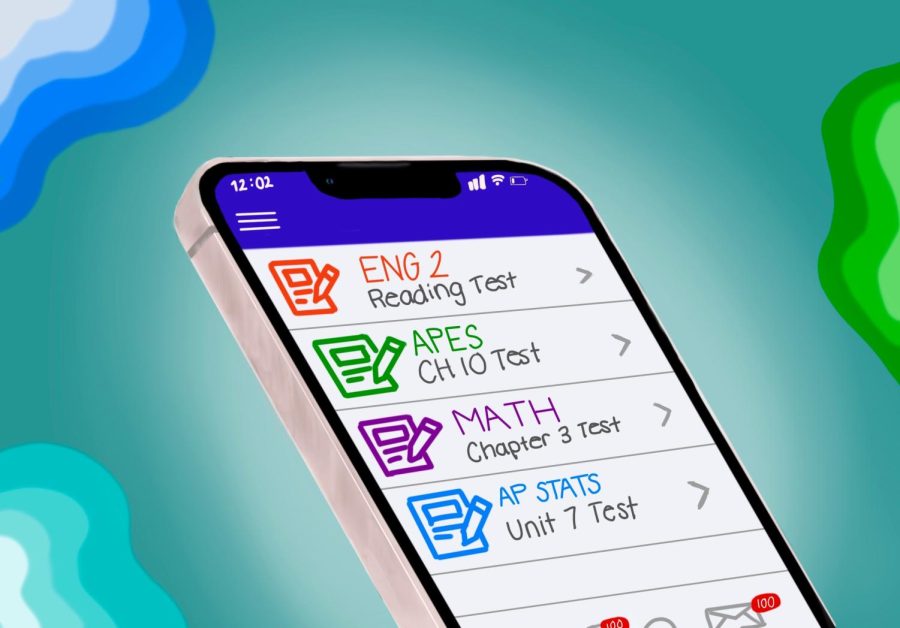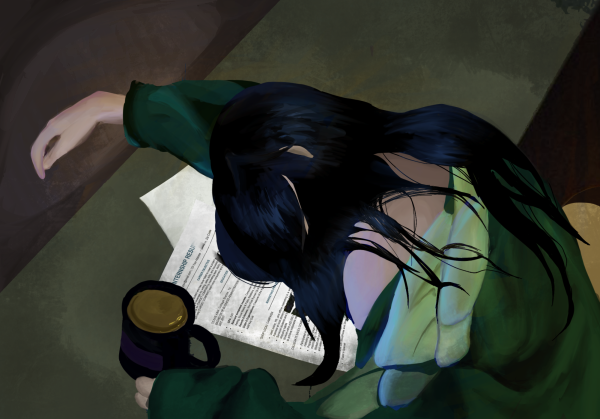Frequent Testing Harmful to Students’ Learning
Frequent tests at Campolindo are detrimental to students.
It’s 11pm on a Wednesday night. You are sitting at your desk with a dim light shining over the papers and packets that cover the surface. The rest of your house sleeps as you are struggling to keep your eyes open, asking yourself how much more you have to do. Your hands shake from typing and your head aches from the endless memorization. You know you have to get to bed at some point, but the thought of walking into your class to take the test unprepared keeps you awake.
This is a common scenario for too many students. Even in one’s early years in high school, it seems as though tests are constantly stacked on top of eachother. While students understand that we must be evaluated on our understanding of the concepts we are learning, the frequency of these tests can be very detrimental to a student’s learning process.
To start off, students having tests so often throughout the week can leave them scrambling for time to prepare for each of them, and causes disruptions in their sleep schedule. According to the Huffington Post, it is proven by professionals that sleep is a key element in a positive performance on a test. Students spend 7 hours on campus, leaving them with no choice but to place their studying time after school, often eating away into the nighttime. With so many tests assigned in so many different subjects, students are often left with no choice but to stay up late to finish all of it. Using this valuable time for studying rather than sleep affects students’ performance on tests, and leaves them groggy and exhausted the next day.
Additionally, having to study a large amount of different subjects for different tests at 1 time can result in poor performances. Having to cram in information about multiple subjects at the same time can make it very difficult to retain the information needed to do well on these tests. Due to the sheer number of tests, it can be difficult for students to distribute their study time equally among subjects, leaving them stronger in certain subjects than others.
Any student would without a doubt want to do well on all of their tests, but having to study so many concepts at once puts students at risk of acing 1 test and failing another 1. It’s nearly impossible to do a sufficient job at preparing for a test when you know you have 6 others to prepare for, too.
A significant amount of teachers often warn their students of the things they must do to study, whether it be flashcards every single night, or reviewing a hefty study guide filled with vocabulary. What teachers fail to realize is that students not only have 6 other classes, but also extracurricular commitments outside of their classes. Teachers often act as though their test is the only 1 we have to prepare for, when in reality, we often have multiple tests each day. Students are then shamed for not preparing enough, or even asked why they weren’t able to make time to study. Students are left feeling helpless, struggling to balance their after-school activities with assessments.
It’s not a secret that grades are a large part of the way students see themselves at Campolindo. It is a common to hear people saying, “I got a C on my test – I’m so dumb,” or, “If i dont get an A on this next quiz, my parents are going to kill me.” When teachers make tests such a large portion of their class, it encourages a mindset amongst students that values scores over actual understanding. Always having a test to prepare for can cause students to place too much emphasis on a letter grade rather than the skills learned from in-class activities, homework, or discussions.
The high frequency of tests given is not beneficial to students as they navigate through their high school career. While tests may be necessary to evaluate students’ knowledge, having 1 every week puts too much focus on passing these assessments rather than fully understanding the material. Teachers should be more aware of the effects frequent tests can have on students before assigning them, and adapt accordingly.
Your donation will support the student journalists of Campolindo High School's The Claw. Your contribution will allow us to produce more issues and cover our annual website hosting costs.

Freshman Mia Daly’s passion for freedom in prose drove her to join the writing staff for The Claw.
Daly has always loved writing and English classes....

Freshman Ruthie Stoll is a dancer, tennis player, and foodie. She grew up in a small town in Pennsylvania, moved to the Bay when she was 4, and just graduated...

Alex Gonzales is a senior and a 1st year journalism student on the Art Staff. Gonzales grew up in Montclair before moving to Lafayette. “I joined journalism...


